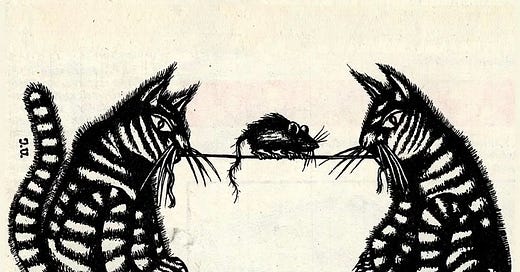I’ve been trying to grasp Western delusions about freedom, which increasingly seem more and more deranged. Here and there, I see people frantically clinging to the privilege provided to them by their status as Americans; pointing their fingers at anyone who dares challenge the scraps and fragments of so-called liberty, quick to label any naysayers, such as myself, as “authoritarian”.
I can’t help but laugh - after all, it is absurd: no health care, a homeless population of 582,000 (as of 2022), billions in “aid” sent to its genocidal satellite state every year, yet this is supposedly the height of opportunity, of civilization. Any suggestion that liberalism and pluralism have led Americans to the death of their morality is met with immediate paranoid defensiveness about possible alternatives and a complete inability to self-critique, a display of the arrogance known around the world as quintessentially American.
Even just a whiff of suggestion, of something else, sends them in a tailspin, so quick to pen an essay or a fucking tweet, about the dangers of authoritarianism and the threat it poses to the proud American tradition of Choice.
Confusing self-determination with the exercise of consumer distinction, it is hard not to pity Westerners, though it is difficult to stay within the realm of pity when confronted with that arrogance mentioned above and the real face of lost morality.
The American national character is a singular ugliness, a smugness, a protective aplomb. The sheer violence that it has been able to abide by is just one example of its depravity.
I often write about a lack of consensus in the West, especially when it comes to issues like morality, but even with material matters like wealth, which under pluralism and liberalism can never have one definition, instead exists to be individually defined, which causes a sort of schizophrenic, lawless landscape to develop.
The “freedom” to consume, to choose, even if the choices are largely insignificant and individualized, is never associated with dependence or loss of control, instead it is celebrated as some necessary tool to “self-fulfillment”. There is a twisted sense of pride in this tunnel vision.
I always come back to individualism, because it would be impossible to observe Western society without its lens.
Pulling from Christopher Lasch’s 1984 book The Minimal Self: Psychic Survival In Troubled Times:
“Now that the public or common world has receded into the shadows, we can see more clearly than before the extent of our need for it. For a long time, this need was forgotten in the initial exhilaration that accompanied the discovery of the fully developed interior life, a life liberated at last from the prying neighbors, from village prejudices, from the inquisitorial presence of elders, from everything narrow, stifling petty and conventional. But now it is possible to see that the collapse of our common life has impoverished private life as well. It has freed the imagination from external constraints but exposed it more directly than before to the tyranny of inner compulsions and anxieties.
Fantasy ceases to be liberating when it frees itself from the checks imposed by practical experience of the world. Instead, it gives rise to hallucinations; and the progress of scientific knowledge, which might be expected to discourage the projection of our inner hopes and fears onto the world around us, leaves these hallucinations undisturbed.”
With a complete lack of public life and rampant individualism, American pluralism insists that moral values can, as Lasch puts it, “no longer be taught or transmitted through examples or persuasion, but are always “imposed” on unwilling victims. Any attempt to win someone to your own point of view, or even to expose him to a view different from his own, becomes an intolerable interference with his freedom of choice.”
Intolerable interference with his freedom of choice.
Indeed this is what I keep coming across: this weakness in the face of curiosity, of consideration, of a world outside of his own. This sickening stubbornness, unwillingness to reconsider. A fragile certainty that cannot stand up to scrutiny, that can only exist within a vacuum.
Anything that challenges the romance of plurality will inevitably be labeled autocratic, or totalitarian. If morality in America is an individual issue, the rulers are free to define their own as well. And they have chosen, repeatedly, to have none.
After all, the unscrupulous requires one to be unencumbered by the limitations of ethics. They came to win and have proven there is no cost too great.
Realism Confidence is a reader-supported publication. If you’d like to support my writing (or help me go to the dentist), please consider becoming a paid subscriber, buying a subscription for someone else, or, if you like what you’re reading, you can also send me a tip via Paypal.





This is so good. Thanks for being a voice of sanity.
"Intolerable interference with his freedom of choice."
That is so common indeed. Most people have become uncurious cowards. And if only their choice was really their own. If only their coping mechanisms weren't full of double standards at best.
I'd argue that leaders of centralized states under w/e political system have almost always been immoral. It's in the job requirements. In rare cases that one isn't, the next one will be. The vast majority of courtiers and puppeteers will be anyway. Top-down projection then (in various ways) leads to totalitarianism and/or collapse, or at least is a major factor.